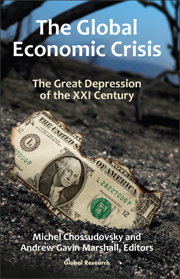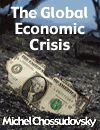‘Global Economic Crisis’ exposes plans for a global military dictatorship

Review of: The Global Economic Crisis: The Great Depression of the XXI Century
Editors, Michel Chossudovsky and Andrew Gavin Marshall
Publisher: Global Research, 2010 (391 pp)
There’s a certain irony to my reading this book while waiting at the Food Stamp office. I’m part of an increasing number suffering under the New World Order’s systematic destruction of the planet’s middle classes so as to concentrate wealth in the hands of fewer and fewer families. While global uprisings now threaten global governance under a single currency, scheming rulers have long anticipated this reaction. In The Global Economic Crisis, we learn exactly how a planet-wide military dictatorship plans to enforce its feudal vision.
Neatly organized into five sections comprising 20 essays by fifteen different authors, Global Economic Crisis carefully ties militarization with the planned economic meltdown. Client states and the U.S. itself have openly and sometimes secretly developed the legal framework for martial law. Testifying before a US Senate committee on Intelligence in early 2009, Obama’s Director of National Intelligence, Dennis Blair, warned that civil unrest owing to the economic collapse posed a greater threat than Arab terrorism. One of the book’s essayists, Bill Van Auken, points out that this is the first time in several years that Al Qaeda did not top the list of threats to national security.
The book’s major theme, supported by well-documented sources (and we expect nothing less from Global Research), hammers out the connection between military dominance and planned economic crises. Cuts in social spending augment the buildup of arms. Intellectual property laws bolster control of the world’s food supply by a handful of multinational corporations. Captured by transnational corporations that escape national anti-trust laws, the “free market” has given way to corporate control of prices, while driving down wages. Social protest of such polices is met by military and police violence.
In GEC, we learn that today’s global economy is driven by trade in oil, arms, drugs, and slavery (including prostitution). Where neoliberalism flourishes, so do these sectors. On the drug trade, Michel Chossudovsky writes, “The underlying military and intelligence objective is to protect the cocaine and heroin markets, which feed billions of narco-dollars into the Western banking system.” Indeed, a recent report by Bloomberg News exposed how Bank of America and Wachovia (now owned by Wells Fargo) finances Mexico’s drug cartels;
“They are multinational businesses, after all,” says [Mexican Senator Felipe] Gonzalez, as he slowly loads his revolver at his desk in his Mexico City office. “And they cannot work without a bank.”
One can travel to any major city in the world and buy supposedly illegal drugs, arms, prostitutes or slaves. The level of infrastructure required for such a ubiquitous global market implies government and banking support.
Those writing about the social and economic ramifications of globalist actions will greatly appreciate Peter Phillips’ essay, “Poverty and Social Inequality.” It’s chock full of charts laying out facts and statistics.
One of the more intricate essays, “The Political Economy of World Government,” details how economic classes are being restructured, with the potential for the middle classes to unite “using access to knowledge, resources and skills to shape transnational processes.” In this piece, Andrew Gavin Marshall shows how various private interest groups like the Council on Foreign Relations, the Bilderberg group and the Trilateral Commission are deliberately restructuring society to make national borders irrelevant.
On par, Ellen Brown’s piece, “The Towers of Basel: Secretive Plan to create a Global Central Bank” shows how a shadowy global banking committee can break national economies, or boost them if the country does what the moneylenders dictate.
Not entirely an easy read, Global Economic Crisis nonetheless exposes the deep underworkings of a criminal class of bankers and industrialists who serve their own economic interests at the expense of everyone else, backed up by an expanding global military presence.
The last book to get me this angry was John Perkins’ Confessions of an Economic Hitman. Like Confessions, strategies to circumvent and overturn the globalists’ plans are offered in GEC. The “Cook Plan,” for example, emphasizes the need to dissolve the debt-based monetary system – a theme often discussed by Ellen Brown. Claudia von Werlhof also offers alternatives, describing the various labor and peasant movements that restore local economies while protecting the environment from the ravages of corporate ecocide.
By fully digesting the information presented, the world’s people can best strategize effective resistance. Nonviolence has been a key feature of street protests and strikes that started in Greece and France last year, though often met with violence by police and military. But the stark “austerity” measures neoliberals are foisting on the globe, while they rake in trillions of dollars in bankster bailouts and no-bid contracts, have emboldened populists across Northern Africa. Austerity has even inspired the otherwise anemic US labor movement, with protests spreading from Wisconsin to Ohio, Michigan, Indiana and beyond.
Such street action must also be coupled with direct measures taken at the local level, however. It is here that the ideas presented in Global Economic Crisis can be of most use. By understanding how banks engineered this “bloodless coup,” we find impetus for restoring national sovereignty and a more sane and equitable economy.
The Global
Economic Crisis
Michel Chossudovsky
Andrew G. Marshall (editors)
Help us get the word out, “like“ the book on Facebook, comment, and share with friends!


